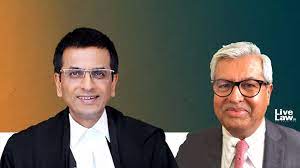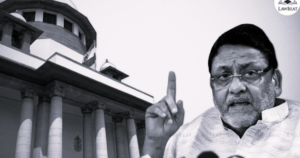
Chandrachud and Dushyant Dave amid a controversy

Former Supreme Court Bar Association President Dushyant Dave stated in an interview that Justice Chandrachud occasionally delivers disappointing rulings in politically delicate cases. Dave explicitly stated that he was “deeply disappointed” in the Justice Loya case ruling.
Dushyant Dave stated that Justice Chandrachud, as Chief Justice of India, must follow the lead of Justice P. D. Desai, a past Chief Justice of the Himachal Pradesh, Calcutta, and Bombay high courts, in a 33-minute interview with Karan Thapar for The Wire. Justice Desai “didn’t give a damn about the executive,” according to Dave. That is the model Justice Chandrachud ought to adopt in his capacity as Chief Justice of India. This point was made concerning remarks made by Justice Chandrachud regarding dissent as “a safety valve of democracy” in his P. D. Desai Memorial Lecture in February 2020.
Dave’s first point—that Justice Chandrachud occasionally (he insisted it wasn’t always or even frequently) can let people down in politically sensitive matters—gains significance in light of what Dave believes to be the current state of the nation and, consequently, the context in which Justice Chandrachud is assuming the CJI.
Because authoritarianism is growing daily and we are living in challenging times, Dave added, “Only the Supreme Court can halt the erosion of our democracy.” Therefore, he said, the Supreme Court’s role—and that of the CJI in particular—is “extraordinarily essential.” This is further emphasized by the fact that, as Dave noted, “the Supreme Court has gone down and down…the court has ceded land to the executive” starting around 2017, following Chief Justice Thakur’s retirement.
Dave concludes that it is a cause for concern that Justice Chandrachud can occasionally be unsatisfactory “in politically sensitive matters” at a time when the Supreme Court and the Chief Justice, in particular, must act as a bulwark against the erosion of our rights, freedoms, and democracy. Dave also voiced his particular disappointment with the Ayodhya ruling, which was allegedly written by Justice Chandrachud, who served on the court as a member of the bench but whose identity has not been officially confirmed. More specifically, Justice Chandrachud’s remarks in May of this year regarding the Places of Worship Act, in which he claimed that while it does not allow for changes to places of worship, you can still determine their character, greatly concerned Dave. This has “opened up Pandora’s vault,” according to Dave. The minority group has “felt shivers down their spine,” he claimed. However, Dave spoke highly of Justice Chandrachud for the bulk, if not all, of the time. “A cerebral giant,” he referred to him as. “Extraordinary skills as a judge,” he claimed. Dave would award him a perfect score of ten for the stance he took in support of individual liberties in cases like the right to privacy, the decriminalization of homosexuality, the right to an abortion, and the right of women of all ages to visit Sabarimala.
Dave also commended Justice Chandrachud’s stance in support of the right to dissent and opposition to the use of arrest as a form of retribution. I don’t want to give you the wrong impression by omitting this because it’s a crucial portion of the interview. However, having said all of that, Dave also added: “For a judge so willing to expand human rights it disappoints me, I must say … the fact he has given greater leeway to the executive”.
The Madras High Court rejected the criminal complaint in the case because those who allegedly gave the money to gain jobs and those who allegedly received it had reached a compromise, which is where the current issue in the case stems from. On September 8, 2022, a two-judge SC bench made up of Justice V Ramasubramanian and Justice S Abdul Nazeer overturned the HC ruling in response to an appeal and ordered that the criminal complaint be reinstated.
The SC had also stated that in two other matters involving offences under the Prevention of Corruption Act, the state should take the necessary steps to have the stay lifted, attorney Prashant Bhushan informed the bench presided over by the CJI. Instead of doing that, the police asked for a new investigation, which the HC approved.
This was contested before the SC, where benches presided over by Justice Krishna Murari and Justice Ramasubramanian were assigned to hear the related cases. After the uncertainty, the latter had subsequently ordered that the CJI be given authority to decide who should hear all cases. Dave then raised concerns about how one of the things ended up being listed before a different bench when the associated matters were being handled by the bench headed by Justice Krishna Murari, who was representing one of the respondents in the case.
The CJI promised to investigate the complaint. But, when Dave continued to speak, the CJI stated that judges must adhere to certain rules. In response, Dave added, “I have the deepest respect for the court. I’m the son of a judge, specifically. Our criticism is never biased and is always impartial. There was more to the story. But Mr Dave, your claim that your criticism is impartial may occasionally be biased yourself, the CJI noted. Your lordships are on the opposing side, so it seems to sense that they would think so, Dave said. Do not misunderstand that, please. One of the petitioners’ senior attorneys Gopal Sankaranarayan claimed that the case must have been heard by Judge Ramasubramanian’s bench because it had been heard previously.








